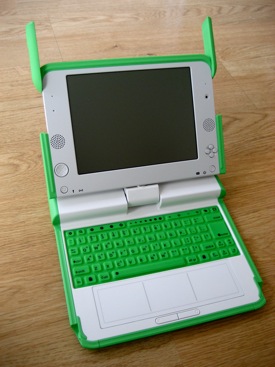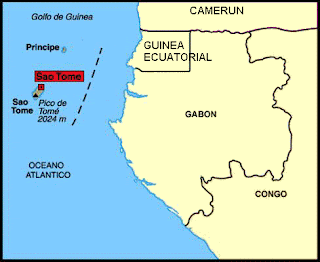Photo from http://wiki.laptop.org/go/Image:Green_and_white_machine.jpg
The One Laptop Per Child Association, Inc. (OLPC) is a U.S. non-profit organization set up to oversee the creation of an affordable educational device for use in the developing world. Its mission is "To create educational opportunities for the world's poorest children by providing each child with a rugged, low-cost, low-power, connected laptop with content and software designed for collaborative, joyful, self-empowered learning."[1] Its current focus is on the development, construction and deployment of the XO-1 laptop.
The organization is led by chairman Nicholas Negroponte, and Charles Kane, President and Chief Operating Officer. OLPC is a 501(c)(3) organization registered in Delaware, USA[2] and is funded by member organizations, including AMD, Brightstar Corporation, eBay, Google, Marvell, News Corporation, SES, Nortel Networks, and Red Hat.[3][4] Each company has donated two million dollars.
OLPC has generated a great deal of interest in the Information and Communication Technologies for Development (ICT4D), in education and one to one computing fields of research.
The OLPC Mission:
To create educational opportunities for the world's poorest children by providing each child with a rugged, low-cost, low-power, connected laptop with content and software designed for collaborative, joyful, self-empowered learning.
The goal of the foundation is to provide children around the world with new opportunities to explore, experiment, and express themselves. To that end, OLPC is designing a laptop, educational software, manufacturing base, and distribution system to provide children outside of the first-world with otherwise unavailable technological learning opportunities.It's an education project, not a laptop project.
Core Principles
OLPC lists five core principles:[7]
- Child ownership
- Low ages.
- -Both hardware and software are designed for elementary school children ages 6–12.
- Saturation
- Connection
- Free and open source software
Some of the participating countries in the XO laptop program, besides São Tomé, include:
- Africa and Middle East
- Ethiopia
- Ghana
- Rwanda
- Sierra Leone
- Iraq (Najmi)
- Lebanon (Sabra and Shatila camps)
- Mali (Quessoborgo)
- Mozambique (Zambezia)
- Nigeria (Abuja)
- South Africa
- Tanzania (Iringa and Dar es Salaam)
- Yemen (Sana'a)
- Americas
- Colombia
- Haiti
- Mexico
- Peru
- United States of America
- Uruguay
- Brazil (Porto Alegre, São Paulo, Rio de Janeiro[Piraí])
- Nicaragua (Rivas)
- Paraguay
- Suriname (Paramaribo)
- Virgin Islands (St John)
- Asia
- Afghanistan
- Cambodia
- Mongolia
- India (Khairat)
- Nepal (Lalitpur)
- Pakistan (Rawalpindi)
- Philippines (Manila)
- Thailand (Ban Samkha)
- Oceania
The Laptop
The XO-1, previously known as the "$100 Laptop" or "Children's Machine", is an inexpensive laptop computer designed to be distributed to children in developing countries around the world,[24] to provide them with access to knowledge, and opportunities to "explore, experiment and express themselves" (constructionist learning).[25] The laptop is manufactured by the Taiwanese computer company Quanta Computer.
The rugged, low-power computers use flash memory instead of a hard drive, run a Fedora-based operating system and use the Sugar user interface.[26] Mobile ad-hoc networking based on the 802.11s wireless mesh network protocol allows students to collaborate on activities and to share Internet access from one connection. The wireless networking has much greater range than typical consumer laptops.
The XO-1 has also been designed to be lower cost and much longer lived than typical laptops.
The laptops include an anti-theft system which can, optionally, require each laptop to periodically make contact with a server to renew its cryptographic lease token. If the cryptographic lease expires before the server is contacted, the laptop will be locked until a new token is provided. The contact may be to a country specific server over a network or to a local, school-level server that has been manually loaded with cryptographic "lease" tokens that enable a laptop to run for days or even months between contacts. Cryptographic lease tokens can be supplied on a USB flash drive for un-networked schools.[27] The mass production laptops are also tivoized, disallowing installation of additional software or replacement of the operating system. Users, interested in development, need to obtain the unlocking key separately (most of developer laptops for Western users already come unlocked). It is claimed that locking prevents unintentional bricking and is part of the anti - theft system[28].
Microsoft is developing a modified version of Windows XP and announced in May 2008 that Windows XP will be available for an additional cost of 10 dollars per laptop.[29]
OLPC also has plans for a second generation XO.[31][32] Key goals for the XO-2 include cost reduction, lower power consumption, smaller footprint and enhanced e-book experience. The XO-2 is targeted for 2011 at the cost of $75. It will consist of two multitouch-sensitive displays, and can be used as a normal laptop (having one of the screens as a keyboard), as an e-book (each screen displaying one page) or in a tablet mode (when flat, the handbook provides a surface for drawing, writing, and games). See also OLPC XO-2 for more info.















